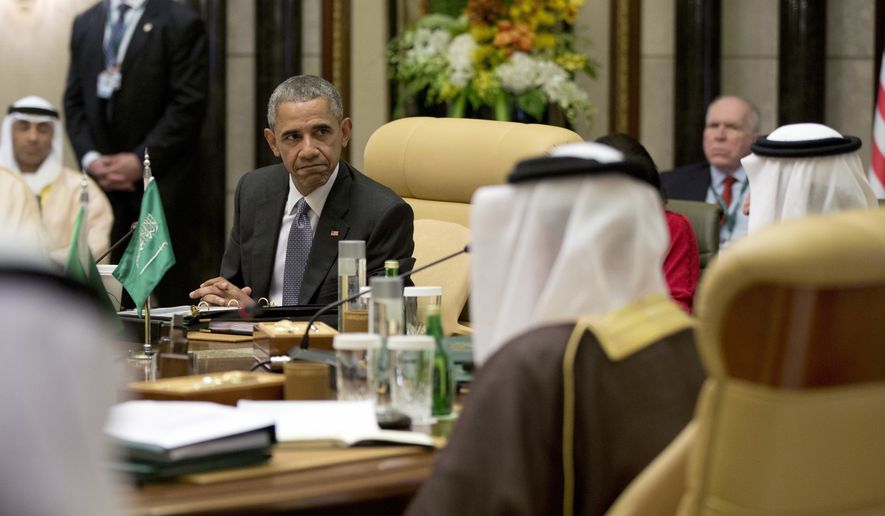Brushing aside a veto threat from President Obama, the Senate approved legislation Tuesday granting Americans the right to sue and collect damages from foreign countries deemed to have been complicit in terrorist attacks on U.S. soil.
The bill has been deeply controversial, with Saudi Arabia — fearful of lawsuits stemming from the Sept. 11, 2001, terrorist attack — warning it would poison relations and could force them to withdraw money from U.S. holdings as retaliation. Mr. Obama has sided with the Saudi government’s threats, adding he fears other nations would respond with laws targeting the U.S.
But senators called the Saudi threat hollow, and Democrats said Mr. Obama’s veto threat didn’t trump the need to help families who lost relatives in attacks.
“If the Saudis did not participate in this terrorism, they have nothing to fear about going to court. If they did, they should be held accountable. It’s that simple,” said Sen. Charles E. Schumer, a New York Democrat who worked on the bill along with Sen. John Cornyn, Texas Republican.
The bill still needs approval from the House, where Speaker Paul D. Ryan was noncommittal last month when asked about it. His office didn’t respond to a request for comment Tuesday.
His reluctance stands in contrast to the Senate, where the measure had overwhelming bipartisan support and cleared the chamber unanimously.
That means that at least in the Senate, there’s enough support to override Mr. Obama should he have to follow through on his veto threat.
The Saudi embassy in Washington didn’t respond to a request for comment Tuesday, but its government had previously been vocal in describing how it would punish the U.S. economically. In March the top Saudi diplomat said his government would sell off some of the $750 billion it holds in U.S. assets.
Victims of the Sept. 11 attacks, who have pushed for the legislation allowing them to pursue their lawsuit, said the Senate vote was the first step toward vindication.
“Our hope is for justice,” they said in a joint statement issued by their lawyers.
The vote was a rare bipartisan legislative spanking for Mr. Obama, who has usually been able to sway enough Senate Democrats to side with him, heading off any policies he doesn’t like. The White House tried to sway Mr. Cornyn and Mr. Schumer this time too — but failed.
I don’t think their arguments stand up,” Mr. Schumer said. “I generally agree with this administration, but when I disagree, so be it.”
Underlying the fight over the bill are questions about the Saudi government’s role in the 2001 attack — and 28 pages from a congressional inquiry into the attack that have been withheld from public view on the orders of then-President George W. Bush.
Some who have seen the pages say they show the network that supported the hijackers, including rich Saudis and perhaps members of the government. Others say the secret pages detail Mr. Bush’s ties to the Saudi government and give inklings of a Saudi network — but they are raw and unconfirmed.
Mr. Obama has asked the intelligence community to review the pages for declassification.
No firm links to the Saudi government have been publicly identified, but the victims’ families have their suspicions.
The Senate bill had been held up as Mr. Cornyn and Mr. Schumer negotiated final changes to try to assuage other lawmakers’ concerns.
But the White House said Tuesday those changes did not satisfy Mr. Obama’s concerns.
“Unfortunately, their efforts were not sufficient to prevent the longer-term unintended consequences that we are concerned about,” said White House press secretary Josh Earnest. “This legislation would change longstanding international law regarding sovereign immunity.”
He said Mr. Obama “continues to harbor serious concerns” that the legislation would make the U.S. vulnerable around the world.
“The administration strongly continues to oppose this legislation,” Mr. Earnest said. “It’s difficult to imagine the president signing this legislation.”
Mr. Cornyn and Mr. Schumer said Saudi Arabia wasn’t the target of the legislation, but said the U.S. can’t be bullied into denying victims justice.
They said their bill is narrow and is limited only to granting victims the right to sue over attacks in the U.S.
Mr. Cornyn said U.S. law already allows lawsuits against sovereign governments in some cases, but under a court ruling that no longer applies in terrorism cases. He said the legislation restores that previous understanding.
Congress has yet to override any of Mr. Obama’s nine vetoes. Mr. Schumer said he expects the Senate would easily muster the two-thirds vote needed should it come to that. But the House remains a question mark.
• Dave Boyer can be reached at dboyer@washingtontimes.com.
• Stephen Dinan can be reached at sdinan@washingtontimes.com.




Please read our comment policy before commenting.